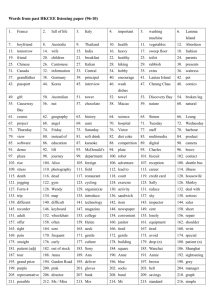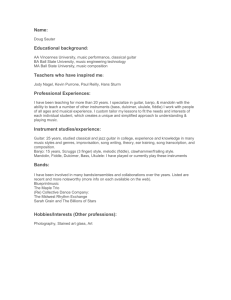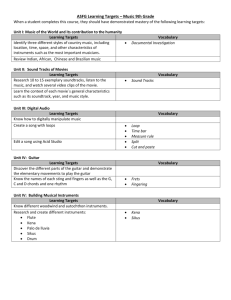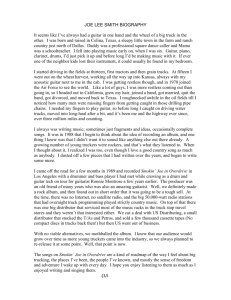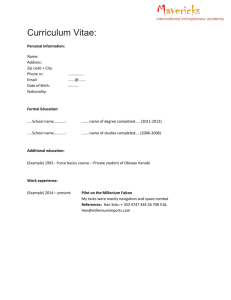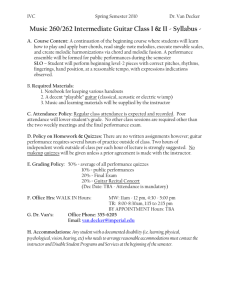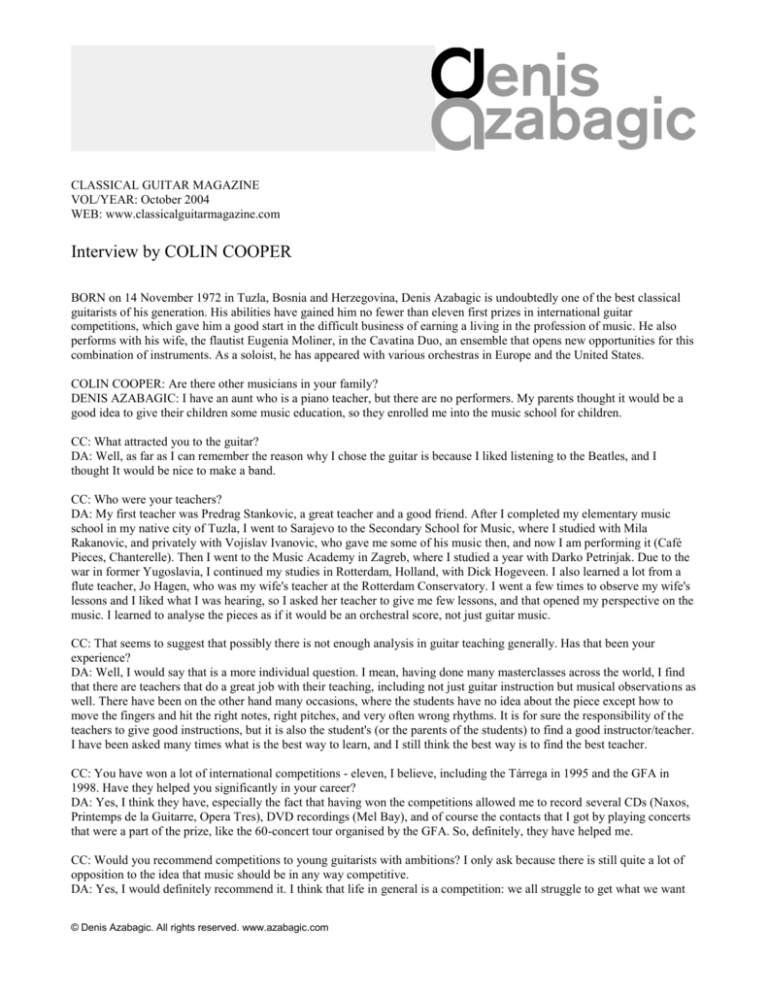
CLASSICAL GUITAR MAGAZINE
VOL/YEAR: October 2004
WEB: www.classicalguitarmagazine.com
Interview by COLIN COOPER
BORN on 14 November 1972 in Tuzla, Bosnia and Herzegovina, Denis Azabagic is undoubtedly one of the best classical
guitarists of his generation. His abilities have gained him no fewer than eleven first prizes in international guitar
competitions, which gave him a good start in the difficult business of earning a living in the profession of music. He also
performs with his wife, the flautist Eugenia Moliner, in the Cavatina Duo, an ensemble that opens new opportunities for this
combination of instruments. As a soloist, he has appeared with various orchestras in Europe and the United States.
COLIN COOPER: Are there other musicians in your family?
DENIS AZABAGIC: I have an aunt who is a piano teacher, but there are no performers. My parents thought it would be a
good idea to give their children some music education, so they enrolled me into the music school for children.
CC: What attracted you to the guitar?
DA: Well, as far as I can remember the reason why I chose the guitar is because I liked listening to the Beatles, and I
thought It would be nice to make a band.
CC: Who were your teachers?
DA: My first teacher was Predrag Stankovic, a great teacher and a good friend. After I completed my elementary music
school in my native city of Tuzla, I went to Sarajevo to the Secondary School for Music, where I studied with Mila
Rakanovic, and privately with Vojislav Ivanovic, who gave me some of his music then, and now I am performing it (Café
Pieces, Chanterelle). Then I went to the Music Academy in Zagreb, where I studied a year with Darko Petrinjak. Due to the
war in former Yugoslavia, I continued my studies in Rotterdam, Holland, with Dick Hogeveen. I also learned a lot from a
flute teacher, Jo Hagen, who was my wife's teacher at the Rotterdam Conservatory. I went a few times to observe my wife's
lessons and I liked what I was hearing, so I asked her teacher to give me few lessons, and that opened my perspective on the
music. I learned to analyse the pieces as if it would be an orchestral score, not just guitar music.
CC: That seems to suggest that possibly there is not enough analysis in guitar teaching generally. Has that been your
experience?
DA: Well, I would say that is a more individual question. I mean, having done many masterclasses across the world, I find
that there are teachers that do a great job with their teaching, including not just guitar instruction but musical observations as
well. There have been on the other hand many occasions, where the students have no idea about the piece except how to
move the fingers and hit the right notes, right pitches, and very often wrong rhythms. It is for sure the responsibility of the
teachers to give good instructions, but it is also the student's (or the parents of the students) to find a good instructor/teacher.
I have been asked many times what is the best way to learn, and I still think the best way is to find the best teacher.
CC: You have won a lot of international competitions - eleven, I believe, including the Tárrega in 1995 and the GFA in
1998. Have they helped you significantly in your career?
DA: Yes, I think they have, especially the fact that having won the competitions allowed me to record several CDs (Naxos,
Printemps de la Guitarre, Opera Tres), DVD recordings (Mel Bay), and of course the contacts that I got by playing concerts
that were a part of the prize, like the 60-concert tour organised by the GFA. So, definitely, they have helped me.
CC: Would you recommend competitions to young guitarists with ambitions? I only ask because there is still quite a lot of
opposition to the idea that music should be in any way competitive.
DA: Yes, I would definitely recommend it. I think that life in general is a competition: we all struggle to get what we want
© Denis Azabagic. All rights reserved. www.azabagic.com
as well as those around us. Nothing that is really important to us is ever handed to us on a plate, so I do not see music
competitions as a bad idea. We are compared and judged through school tests and exams, our concerts are compared with
the concerts of others, and I see it all as normal. However, that does not mean that competitions are the only way to
establish a career; there are other paths as well. There are people who cannot handle the competition situation well, and yet
they are great when they play a concert. So, I would recommend it to young players, but encourage everybody to find their
way and to follow their dream.
CC: You have written a book about competitions (Mel Bay Inc.), designed to help young guitarists. Can you say something
about the main faults which can hold them up?
DA: Many of them have real musical talent, and there seems no reason why they should not win a competition and so give
themselves a good start in their career. Well, the reason I wrote that book for Mel Bay was that I was asked so many times
about my experiences in the competitions. Now, I think that in order to win a competition one needs to be very well
prepared, and that is a complex process. I cannot really pinpoint the main reason that would enable a young guitarist to win.
I feel rather that it is a more of a personal question for everyone. Every passing day I feel that to perform a piece of music
very well, one must have a solid technique, but also a very good understanding of the music, from the mental and analytical
perspective as well as from the artistic/imaginative and inspirational point of view.
CC: You mentioned Vojislav Ivanovic"s Café Pieces, which you have in your repertoire. I admired them very much when I
heard them 20 years ago, but I did not hear any of them again until I went to Belgrade two or three years ago. Why have
they been neglected? What special qualities do you think they possess?
DA: I first played these pieces while studying in Sarajevo, around 1987, 1988. I think they are just six beautiful pieces, and
I enjoy playing them. They remind me of Barrios most of all, but the very first one is a homage to Piazzolla so it sounds like
Piazzolla's tango. I do not know why they were neglected. Why was the music by Bach neglected for so long? I guess
sometimes music needs to be "discovered" by someone. I just like them and I constantly play them and hopefully will
record them soon. I am also finding that audiences enjoy them tremendously.
CC: Can you say something about your latest CD, Acrobats?
DA: This is our latest release. We met David Leisner some years ago in Florida, at the Stetson International guitar
workshop, and he played ona cassette tape a piece called Acrobats. We liked the piece very, very much, learned it and have
been performing it ever since. Then slowly we learned other pieces that he composed, and the idea was born to make a
complete CD with his music. The Chicago-based label Cedille records was interested in this project, so it all came together
nicely. The CD has several flute and guitar pieces (Acrobats, Dances in the Madhouse, El coco, Nostalgia) as well as two
trios: Trittico, for flute, guitar and cello; and Extremes for flute, guitar and clarinet. We enjoy David's music tremendously.
CC: The guitar was isolated for so long that it acquired a reputation for being closed-in, with audiences consisting only of
guitarists listening to music composed by other guitarists and of little interest to anyone else. Your work in the flute and
guitar duo (Cavatina Duo) with your wife, Eugenia Moliner, obviously opens it out considerably, but do you feel that the
solo guitar is beginning to reach out to a wider audience, with programmes that perhaps have more general appeal?
DA: The more I do this (perform), the more I realize that the guitar is an instrument that has a specific audience. One of the
reasons we are more isolated from the rest of the other musicians is the fact that the guitar is not an orchestral instrument.
During the studies at the conservatories and universities we do not have to take orchestral studies, as do all the other
instruments except the piano. Then you can see how the people interact with each other within their instrumental group:
strings, woodwinds, brass, percussion.... The piano has an advantage that most of the instruments require an accompaniment
when played solo, so that puts the pianist in touch with other musicians, not to mention, of course, the repertoire that the
piano has, both solo and, more importantly for this issue, the chamber music repertoire.
So, for the guitar to reach a wider audience I think the path lies in chamber music. There is a huge chamber music activity in
the world, and the guitar can definitely take a bigger role. I am very dedicated to my Duo, and it is as close to my heart as
solo playing.
© Denis Azabagic. All rights reserved. www.azabagic.com
Talking about other venues to play, I have just been invited to perform with the Chicago Symphony Orchestra in the
production of Osvaldo Golijov's opera Ainadamar. In the end, music is music. I remember one thing David Leisner told my
wife when they were talking about music, career, etc, he said: "If you play solo, that means you need a pianist, and you
already play with the guitar. What is the difference? Music is music."
I feel the same. That is why I think my priority is to play music, and I do not prioritize between solo or chamber music or
performances with orchestra. I also get mixed feelings when we perform for guitar societies. Sometimes the feeling is that
the audience would like to hear more solo guitar, sometimes the audience loves to hear new repertoire and the role of the
guitar with another instrument. It also inspires people to play chamber music for fun, not just solo by themselves. So, I think
we will always have an audience that is strictly guitarist, but there is definitely space that we can explore and "conquer"
with chamber music.
There is an issue I have to emphasize when it comes to chamber music playing: Guitarists: Do have your part learned well
before going to the rehearsals. I cannot stress this enough. Many times I have witnessed a duo of guitar and another
instrument, where the guitarist is struggling but the other musician is not. We cannot sight read that well; it is a skill that
requires many years before we can play even simple line. The other important matter is the rhythm. By playing solo all the
time, we tend to take "liberties" (rhythmical ones) that you cannot do in chamber music (and we should not do it when
playing solo either). What I mean is that we have learned the piece incorrectly. One thing is to learn a piece partially by ear
and imitate someone's interpretation. I do not see that as being free with the music. Musical freedom comes from knowing
the piece so well (notes, rhythm, fingerings, harmonies, dynamics, expression markings, structure, interpretation...). When
playing solo it is very easy to catch a wrong note (wrong pitch), but it is much more difficult to observe a wrong rhythm. If
the note is not played rhythmically correct then it is a mistake, same a wrong pitch. This becomes very obvious when
playing chamber music.
CC: How far do you agree with Segovia's statement that "It is the artist that people follow, not the instrument"? And if it has
any truth in it, is it also the case that it is the artist people follow and not the music? To put it another way, why do we go to
a concert of music?
DA: I love this question. I think there is a lot of truth in the Segovia quote. I think many people fall in love with the classical
guitar. I asked a friend who is a great guitar aficionado, why does he like the guitar over other instruments? He said he liked
the sound of it.
I think the guitar gets to the ear very quickly; it is a very intimate instrument. We all have preferences, and so it is the case
with falling in love with the sound of the guitar.
Now, talking about the Segovia quotation and your follow-up question, I think it is the human spirit that reaches other
people. We all use different instruments to express something, but all the instruments are dead material things if the human
spirit does not speak through them. I think that composers make fantastic music, which on paper is absolutely uninteresting
to the listener, because obviously there is no way of communication between that what is written and the person who wants
to listen to it - not unlike written text, right? There is a huge increase in the literate population in the world, from, let's say,
just 150 years ago and now. So those who know how to read do not need anyone to read a book to them. A book would be
"dead" if it is not read. Now imagine the time when most people did not know how to read, and someone else would read
for them. Let's call them reading performers. If you had ten of them, people would make their preference regarding who
they would most like to listen to. Why? Because someone would perform, interpret, better or more engagingly then others.
That is why I see the truth in Segovia's words. An artist captures the audience, but he also has to have captivating music.
So I think people follow both the music and the artist. Then they also choose which instrument they like more. A fantastic
artist can give a not-so-interesting performance because of the repertoire, right? That is why some music survives the test of
time, and some does not. It is a human spirit that moves humans, through books, visual art, music, performances of all sorts.
And why do we go to concerts? Because there is something so special in being there when a human spirit is engage in
© Denis Azabagic. All rights reserved. www.azabagic.com
creating. Once a friend of mine asked me if I ever composed, and he phrased it in a way that made a performance of other
people"s music seem less creative then composing it. In a sense I agreed with him, but more and more I am inclined to differ
now. I just do not feel I need to compose, in the same way as many who compose cannot perform as well as those dedicated
to performance. That is the beauty of concerts and all live performances; the moment when the artist is free to connect with
the music, his spirit is free and going who knows where, and that then takes the listener along.
To elaborate a little more, it is great to have CDs and other digital media now, to play the music for ourselves whenever we
want. That has its own value, no question about it, but it cannot replace live performance.
Awards made to Denis Azagabic:
• 1st prize, International Guitar Competition "Jacinto e Inocencio Guerrero", Madrid, Spain.
• 1st prize, International Guitar Festival IGF-Germany
• 1st prize, International Guitar Competition "Rene Bartoli", France.
• 1st prize, special prize for the best interpretation of music by Tárrega and public prize at the International Guitar
Competition "Francisco Tárrega", Spain.
• 1st prize, International Guitar Competition "Manufacturas Alhambra", Spain.
• 1st prize, International Guitar Competition "Printemps de la Guitarre", Belgium.
• 1st prize, International Guitar Foundation of America Competition (GFA), USA.
• 1st prize, Schadt String Competition-USA
• 1st prize, Stotsenberg International Guitar Competition, USA.
Two further international guitar competitions were won by Denis Azabagic, one at Volos when he was only 17, the other in
the Netherlands when he was studying there, bringing the total to eleven.
© Denis Azabagic. All rights reserved. www.azabagic.com



